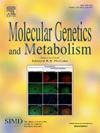欧洲苯丙酮尿诊断和治疗指南:第一次修订
IF 3.7
2区 生物学
Q2 ENDOCRINOLOGY & METABOLISM
引用次数: 0
摘要
苯丙酮尿症(PKU)是一种常染色体隐性遗传的苯丙氨酸代谢疾病,由缺乏将苯丙氨酸转化为酪氨酸的苯丙氨酸羟化酶引起。未经治疗,PKU会导致血液和大脑中苯丙氨酸水平升高,从而导致严重的智力残疾、癫痫和行为问题。对于欧洲北大指南的第一次修订,根据新的研究结果重新评估和更新了以前的建议。21名专业人员分为4个工作组,由一名协调员兼主席提供支助。除了更新以前的70项建议外,还列入了20个新主题,因此在准则的第一次修订中总共有87项说明。截止到2022年9月,对研究出版物进行了审查。根据GRADE方法,证据被分为高、中、低、极低或专家意见,建议被分为有条件的或强烈的。所有建议都在14次全体在线或面对面会议上进行了讨论。如果超过75%的专业人士同意,建议就被接受。在不修改建议的情况下,2017年欧洲指南中报告的文本仍然有效。本文章由计算机程序翻译,如有差异,请以英文原文为准。
European guidelines on diagnosis and treatment of phenylketonuria: First revision
Phenylketonuria (PKU) is an autosomal recessive inherited disorder of phenylalanine metabolism caused by deficiency of the enzyme phenylalanine hydroxylase that converts phenylalanine into tyrosine. Untreated, PKU results in elevated phenylalanine levels in blood and brain, which cause severe intellectual disability, epilepsy and behavioural problems.
For this first revision of the European PKU Guidelines previous recommendations were re-evaluated and updated according to new research findings. Twenty-one professionals were divided across four working groups and supported by a coordinator and chair.
In addition to an update of the previous 70 recommendations, 20 new topics were included, resulting in a total of 87 statements in this first revision of the guidelines. Research publications were reviewed up until September 2022. Evidence was graded as high, moderate, low, very low or expert opinion and the recommendations were graded conditional or strong according to GRADE methodology. All recommendations were discussed during 14 plenary online or in person meetings. Recommendations were accepted if more than 75 % of the professionals were in agreement. When recommendations were not amended, the text reported in the European guidelines of 2017 remains valid.
求助全文
通过发布文献求助,成功后即可免费获取论文全文。
去求助
来源期刊

Molecular genetics and metabolism
生物-生化与分子生物学
CiteScore
5.90
自引率
7.90%
发文量
621
审稿时长
34 days
期刊介绍:
Molecular Genetics and Metabolism contributes to the understanding of the metabolic and molecular basis of disease. This peer reviewed journal publishes articles describing investigations that use the tools of biochemical genetics and molecular genetics for studies of normal and disease states in humans and animal models.
 求助内容:
求助内容: 应助结果提醒方式:
应助结果提醒方式:


